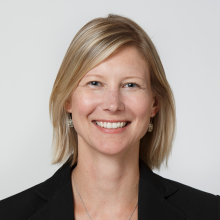May 2009 Spotlight on the SRCD Policy Fellow: Taryn Morrissey, Ph.D.
2008-2009 Federal Congressional Policy Fellow
During fellowship orientation, we were given a rough description of a “typical day of a Congressional staffer.” At 9:00am, you step into the office, prepared for the four meetings you have planned; by 9:15, those four meetings have turned into six; by 9:45, you’re left with four, but not the ones you’d planned on. The next 8 to 11 hours of the day are spent darting from office to office, coordinating with fellow staff, listening to constituents, and preparing elected officials for the demands of their day.
Indeed, as an SRCD Congressional Fellow in the Health Policy Office of Senator Edward M. Kennedy’s Health, Education, Labor and Pensions (HELP) Committee, I have found that many of my days mirror this image. I feel extremely lucky to be working on health reform during this historic time, an opportunity that comes around once every couple of decades. I joined the office in October 2008, when there was an air of uncertainty in Washington, DC and across the country – uncertainty about the election, uncertainty about the foundations of our economy, and uncertainty about what policy goals a new President would put forward. I’ve seen the process unfold, from the election, to the inauguration, to the current momentum and excitement surrounding health reform.
Yet, in spite of the contagious energy and enthusiasm, the devil is in the details. Under the broad umbrella of health reform, issues in my portfolio include child health, the health workforce, and promoting quality, efficiency, and prevention and health promotion in the health care system. Expanding insurance coverage alone cannot fix our health care problems; we also need to address the widespread disparities of access and quality, and change how care is delivered. My background in developmental science has been key to understanding policy changes in context and promoting health and well-being across the life course. I’ve been able to draw from my experience in child care research to navigate parallel issues apparent in the health care system, such as measuring and improving quality while limiting costs.
Within these broad issue areas, I contribute to a number of tasks in the office. I assist in the planning and execution of hearings; write talking points, questions, and statements for hearings and the press for the Senator; meet with and respond to constituents and interest groups; speak to large groups on the health care workforce and health information technology issues; and track, analyze, and craft legislation. Each and every of these tasks can pop up surprisingly, and I’ve learned to prepare for the unexpected. Much of my day is spent not at my computer but in meetings, hearing the different perspectives of constituents, interest groups, and congressional offices, which has both enlightened my outlook as well as broadened my understanding of how these points of view are incorporated into the political process. The training and support provided by SRCD and the Association for the Advancement of Science (AAAS), as well as my fellowship colleagues in the executive branch agencies, have proven invaluable in navigating the policymaking processes at the federal level and making the most of my fellowship experience.
My greatest accomplishment will be to play some small role in reforming our nation’s health care system. We are building upon the hard work of so many before us, and I am very fortunate to learn from and work with an amazingly smart and dedicated group of staffers at such a historic time. I am honored to have had the opportunity to witness the democratic process first-hand, and will walk away from Capitol Hill both in awe of and inspired by my colleagues and our elected leaders.
